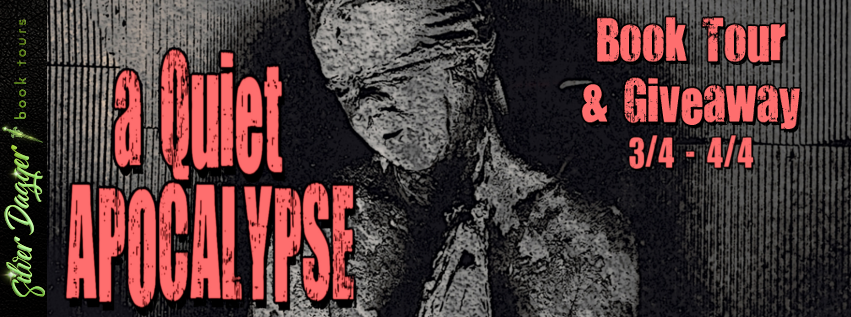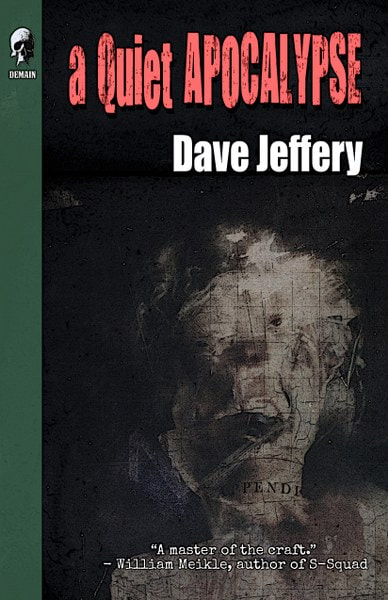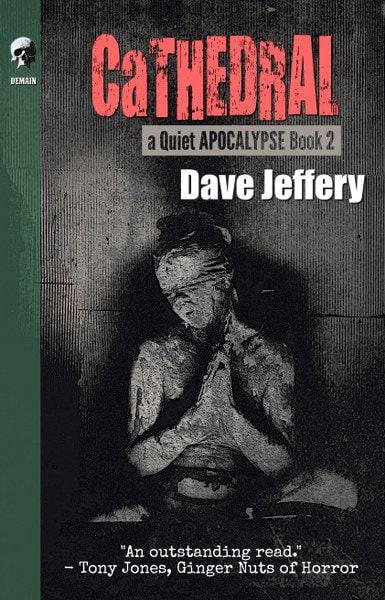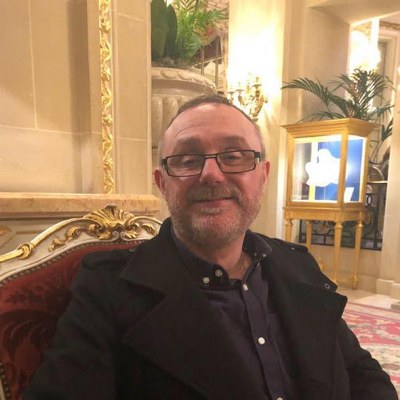A QUIET APOCALYPSE BY DAVE JEFFERY
EXCERPT ONE
Sometimes I struggle to remember what it is like to have hope.
These days it's an elusive entity, like a day free from Crowley’s scowl. The
weather doesn't help. Thunderheads wheel in from the west, bringing with
them dreary light as fat raindrops fall, hitting my poncho like the bodies
of dead birds splattering the asphalt. Beneath my poncho, my arms are in
sleeves that are stitched to a belt harness giving my limbs limited
movement.
I lean forward, giving my hands a chance to pull my baseball
cap down to protect my face from the rain. A trickle of water exploits a
small gap in the collar of the poncho and begins a slow, icy descent,
causing an involuntary shudder. I shuffle on the camping chair, rubbing
my back in the upright until the raindrop is wiped dry against my shirt,
though my eyes remain fixed on the road running past the village, making
sure it is clear, safe. I chew on my gum shield, the thick plastic sticking to
my mouth. To keep it in place, a leather thong wraps about my mouth
and cheeks. I have to breathe through my nose or the gaps left available
to my lips.
Crowley is beside me, sat in his own chair, wearing his own
poncho, holding the leash of twine and strips of leather, braided and
tethering us together. He, too, is scanning the featureless countryside,
yet I know it is fear that keeps him alert, fear of losing me to the
Samaritans.
A QUIET APOCALYPSE BY DAVE JEFFERY
EXCERPT TWO
The heavy breathing continues behind us and I turn to the
Samaritan I’ve blasted and who is now lying supine on the stairs. Paul
joins me as we look down at the boy gasping for air. Where the bullet has
struck his neck, bubbles fizz as though he has a strawberry soda pouring
through the wound.
“Can’t be older than sixteen,” I whisper. “What have I done?”
The weapon in my hand drops to the floor, a statement of my
contempt for what I’ve become, what I am.
Kid-killer.
“What you’ve done is stay alive and that’s all we have now.”
Paul steps up to the boy and places the muzzle of the rifle against
his brow. There is no acknowledgement in the kid’s eyes, just the faraway
look of the dying.
The rifle quickens the boy’s passing with a report that is as loud as
any I have heard in the past half an hour. It is an act of mercy and an
execution blended together until it becomes one and the same.
Paul turns to me, his face grim. “We’ll drag them all out into the
street. I guess the dogs will be eating well for the next few days.”
I bow my head, not seeing anything good in his statement.
EXCERPT ONE
I wake with my heart thumping and my nightwear damp with
sweat. As I throw back the sheets, the cool air puts goose bumps on the
exposed flesh of my arms and legs. I clamber to the edge of the bed,
sitting up and hugging myself. I can shut away the past during the day,
busy myself with the banal, but when sleep takes me, the edges of selfdeception
fray like old carpets.
The dreams are always the same, the last days of civilisation
coming, not as fire and flame, but as empty streets and great clouds of
flies that rise like smoke from the dead and infected. I take a breath and
hold onto it until my eyes blur and my lungs ache, forcing my mind back
into the here and now, where I am alive and moving on.
These moments are a reality reboot that slow the heart and, when I
allow my breath to escape, my pursed lips tingle and tickle, and I know
that I have released a soft hiss into the world that I will never hear.
Each of us can lay claim to a great loss. Suffering is a subjective
experience, after all. I shall say, without guilt of narcissism, the disease
took all of my greatest loves. So it is that I am the Child of the
Apocalypse, an orphan of the old world. This used to seem bleating, even
to me. But the end of the world makes people not give a shit about selfpity.
Because these days, it’s a trait owned by all.
CATHEDRAL BY DAVE JEFFERY
EXCERPT TWO
We turn a corner, there is another half a mile of High Street until
we reach the city gates, another run of storehouses. As soon as we have
walked twenty paces, we see the group of four people sitting on the
concrete ramp leading up to a warehouse.
There are three men and one woman, of mixed ages, but united by
their shaven heads and malformed hands. The fingers appear twisted, the
palms convoluted like panels of corrugated metal. One man has support
splints on his wrists, bulky leather straps keep the haphazard bracelets in
place. The four vagabonds sit and, at our approach, hold out their ruined
hands whilst the woman types slowly on her tell-pad with a zig-zagged
finger.
Good peOple! HAv meErcy at our timme of neeDD.
Alice intercedes. Her comment is brief, and I can guess it’s not
welcoming.
I look upon these poor souls, victims of a momentary lapse of
reason, and the long-term penalty it has incurred. It is pity that has me
pulling a wax wrapping from the folds of my gift bag and tossing it to the
woman. She has no chance of catching the alms but tries regardless, and
it hits the street, the wax paper keeping the sandwich inside it contained.
The men sit back as the woman scoops it from the concrete with the
combined mangled digits of both hands.
I feel Alice place her palm in the small of my back and urge me
along.
You shouldn’t encourage them, Sarah. They get their daily rations,
even though they contribute nothing.
I watch as the woman opens the wrappings in her lap, the white
paper stark against the grey rags of her skirt. The men sit patiently, their
eagerness betrayed by their twitching, twisted fingers, and she portions
out the sandwich, distributing each piece like a mother feeding her young.
Once this is done, she looks up at me, a crown of stubble on her
head, face etched with the deep lines of chronic pain, and she lifts her
parody of a hand to give a wave of thanks.
Alice nods as if her worst fears have come true.
See? Now they’ll expect it every time. You’re just a big softy. It’s
my new name for you, Sarah Soft!
I smile and turn away from the group as they take comfort from
their meagre meal. The laws of Cathedral can be harsh.
But as Chapter 9 reminds us, a life without them is worse.
What are your top 10 favorite books/authors?
Cannery Row/Grapes of Wrath/Of Mice and Men by John Steinbeck
Walking on Glass by Iain Banks
1984/Animal Farm by George Orwell
The Road by Cormac McCarthy
The Dregs Trilogy by Chris Kelso
I Am Legend by Richard Matheson
Fahrenheit 451 by Ray Bradbury
Lord of the Rings by JRR Tolkien
The Dead Zone by Stephen King
Pontypool Changes Everything by Tony Burgess
What book do you think everyone should read?
The Road by Cormac McCarthy – Its bleakness is a backdrop against which the tiniest glimmer of humanity shines like a star. As a book it is written in a deliberately provocative manner, without formatting. From narrative to characters, everything is stripped down and laid bare. But, oh, my – the narrative is just breathtakingly beautiful. A true master of his craft, for sure.
How long have you been writing?
I’ve always been a storyteller of sorts. When I was 7-8 years old, I used to write and illustrate my own comic books, usually science fiction and fantasy tales. At the age of 11 I’d discovered horror through British writers such as James Herbert and Guy N Smith. By my early teens I had written two horror novellas, THE BOX and STAG BEETLE, and a science fiction adventure called BADLANDS. They’re all stowed in the loft and they’re all pretty terrible!
Do the characters all come to you at the same time or do some of them come to you as you write?
I have an idea of most characters from the get-go, but sometimes others appear as the story progresses. The important thing is to make these emergent characters as relevant as those integral to the plot, otherwise they become disposable, one-dimensional entities that exist only to serve the storyline.
What kind of research do you do before you begin writing a book?
Research is extremely important as it allows you to get things right. When you do this, it makes your imaginary world more authentic. When you get it wrong, readers feel frustrated and short-changed that you have not put as much time into the background material – especially if they have affinity with the topic you are including in the story. There does need to be some suspension of belief in, say, something like my FROSTBITE series, where yetis and aliens battle it out on the slopes of the Himalayas, but the geography has to be accurate in order to foster this mindset. People tend to be comfortable allowing for poetic license if they know you’ve taken the time and care to make the rest of the story as believable as possible.
My research process tends to align with my story development. As I outline the plot, I tend to highlight areas of research needed. I have a background in health science (I have a BSc (Hons) in Mental Health Studies, and an MSc in Health Studies) so I’m familiar with the research process and apply this wherever possible.
Do you see writing as a career?
For me, writing in itself is not about making money, it is about the innate desire to create and tell stories. I am a better person when I can fulfill this need and it is therefore part of who I am. To get paid for it is the icing on the cake but I can just as easily eat cake without the icing, if you see what I mean?
Do you read yourself and if so what is your favorite genre?
I read two hours a day, every day. I struggle to see how a writer can write without reading. By osmosis, this is how you learn your craft, so reading is a significant part of the writing process. I tend to read a lot of independent horror, supernatural and science fiction, and classical literature, but I’m easily at home in a good crime novel, for example LEE CHILD, or an adventure book such as DAN BROWN. I don’t get bogged down with trends that dismiss some writers over others, a good story is a good story as far as I’m concerned.
Do you prefer to write in silence or with noise? Why?
I always write in silence as I don’t want to get yanked out of the world I’m creating. In a houseful of people, you’re going to get background noise, that’s all part of being in a family home. But I make the choice not to put music on, mainly because someone has dedicated time and energy into creating that piece of music and it is made to be heard, not slip into the background where it becomes redundant. To me, this is the greatest form of disrespect you can give to a musician.
Do you write one book at a time or do you have several going at a time?
I tend to have multiple writing projects on the go at any one time. At the moment I’m working on two novels and a series of magazine articles. I think this helps keep everything fresh and when you hit a wall in one project, you move to another and return later. So, the process continues and the concept of ‘writer’s block’ is a term I understand but have never particularly experienced.
If you could have been the author of any book ever written, which book would you choose?
Anything by Steinbeck. His writing is sparse yet poetic, and he has an ability to place a scene or a character in a reader’s mind with so few words, it’s a sign of someone in total control of what they do. Cannery row is my all-time favorite book so, if you were to insist that I chose one, it would be that book.
Pen or typewriter or computer?
These days I use my iPhone to make notes and transfer these to my MacBook. This is for convenience as I can now write anywhere at any time. Sometimes the story won’t wait for you to get home and dig out your notebook!
What makes a good story?
Memorable characters. I say this because without them, the story is merely a clinical process of getting from point A to point B. The story only becomes memorable because of how it affects the characters, those we care about and want to succeed, or those devilish villains who we want to see get their comeuppance. Imagine The Handmaid’s Tale without Ofred or the malignant Aunt Lydia.
What are common traps for aspiring writers?
Thinking it is easy to write and sell a book. First of all, writers who think it is easy don’t tend to be good writers! The ability to tell a story is something that takes time, the skills need to be honed so that your reader stays engaged, caring for the characters enough to want to know what happens to them on their journey from the first page to the last. Not even the greatest writers think writing is easy, and aspiring writers would do well to dispel that myth from the outset.
Despite being a solitary pursuit, the whole process of creating a book actually involves collaborative working, if you want it to succeed, that is. It starts with the beta-readers and, if you’re VERY lucky, a publisher and editor. You need to have a thick skin because beta-readers will tell you if what you’ve written makes sense and is good enough to fix and continue with, and editors pull no punches when it comes to getting the best out of you and your work.
Then you have to promote your book. Don’t think people will help you, writing is competitive, and the marketplace crammed with existing material. Don’t allow your frustrations to overspill on to social media, readers and publishers judge you on behavior and on what you write in posts. Do not, under any circumstances and despite what you may have read online, be tempted to friend people on various platforms for the sole purpose of sending them a link to your book. This is not only very rude and disrespectful, but also ineffective as a marketing strategy. You need to engage with people about writing and reading, see them as kindred not customers. In terms of social media, NEVER suggest your own book if people in a thread as for recommendations. I see this happen all the time and it comes across as both cynical and desperate. People will simply not buy it and fail to engage with you from that point on. Bottom line is - write as though your book is never going to be published. That will give you a good indicator as to the fundamental reason you want to write. It’s not a get rich quick scheme. Even successful writers have had to balance writing with a day job for most of their careers.
What is your writing Kryptonite?
Tiredness, which is why I make sure I get plenty of rest if I have a major project on the go.
Do you try more to be original or to deliver to readers what they want?
I always try to be original, and sometimes this has been to my own detriment. I wanted to write books in popular genres but not at the risk of covering old ground. This is a good way of sucking the life out of a project and this will ultimately show in the final draft. My yeti books have a science-fiction premise, my werewolf and zombie books have a crime slant. I would rather be criticized for being different than being bland or predictable.
If you could tell your younger writing self anything, what would it be?
Believe in yourself.
What’s the most difficult thing about writing characters from the opposite sex?
Not to write in cliché. One of the things I found out very early on is the importance of beta-readers. I have several and they will give instant feedback on whether a character rings true or not. The same can be said for other gender issues, it is vital that you garner a good pool of beta-readers representative of society.
How long on average does it take you to write a book?
When I was working full time, it tended to be around six months for a first draft, depending on book length. These days it averages out at about three months from start to a good third draft. I’m very lucky to be in this position.
Do you believe in writer’s block?
No, but I understand the concept of hitting a wall on a work in progress. This is why I always have several projects on the go at any one time, so that I can move between them.












Comments
Post a Comment